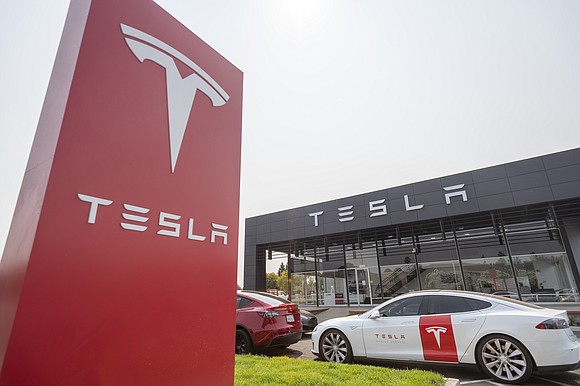Tesla is trying an old trick to boost its stock. It may not work
CNN/Stylemagazine.com Newswire | 6/13/2022, 11:45 a.m.

Originally Published: 13 JUN 22 07:54 ET
Updated: 13 JUN 22 07:58 ET
By Julia Horowitz, CNN Business
(CNN) -- In recent years, when a company announced it was splitting its stock, Wall Street went wild. When Tesla revealed such plans in 2020, its shares immediately shot up. They climbed 66% over the following 12 months.
But as concerns about the Federal Reserve, inflation and the economy plague investors, those days may be over.
Tesla announced Friday that it will ask investors to split its shares 3-to-1 at its annual meeting in August. But the stock barely moved after hours Friday and is sliding in premarket trading Monday. Shares are down more than 30% since the company first teased a stock split in late March.
In the case of a 5-to-1 split, someone who owned one share priced at $100 would instead receive five worth $20 apiece. A 3-to-1 split would dole out three shares worth $33.33.
That may not sound like a big deal. Yet in the past, it's helped drive demand, since it makes shares more accessible to everyday investors.
It also makes it more likely that companies will be included in the Dow Jones Industrial Average, which tends to include less expensive stocks. Apple announced a 7-for-1 stock split in 2014 and joined the Dow in 2015.
In the current market environment, it's hard to get anyone excited about Tesla or many of its fast-growing peers. Amazon's 20-for-1 stock split took effect last Monday. Its shares are still down 25% year-to-date. Alphabet, which owns Google, will split its shares 20-for-1 in July. The stock has fallen 23% this year.
These three companies all took a beating on Friday after government data showed that US consumer prices are rising at the fastest rate in 40 years. The Consumer Price Index leaped 8.6% for the 12 months ending in May.
That rounded out the S&P 500's worst week since January. The concern is that higher inflation will push the Federal Reserve to be more aggressive in hiking interest rates. When rates rise, it hurts stocks like Tesla, whose prices are tied to expectations for longer-term growth and earning potential.
Tesla has already seen tons of money wiped off its valuation this year. In January, it was worth $1.15 trillion. Now its market value is $722 billion.
CEO Elon Musk's recent warning that he has a "super bad feeling" about the economy, combined with confusion over whether he plans to cut jobs at the automaker, hasn't helped. Federal investigators also said last week that they're expanding their probe of Teslas that have slammed into parked first responders' vehicles.
At some point, Wall Street's bargain hunters may enter the scene, putting a floor under stocks that have been hit hard by the recent sell-off. But this moment hasn't arrived yet — even with stock splits on the table.
$5 gas has arrived. Is $6 around the corner
Over the weekend, the national average price for a gallon of regular gasoline hit $5 for the first time as drivers brace for a painful summer at the pump.
Gas prices have been rising steadily for the last eight weeks. The latest milestone, achieved Saturday, marked the 15th straight day that the AAA reading notched a record.
The average price of a gallon of gas was $4.42 one month ago and $3.08 a year ago. But the pandemic and the war in Ukraine have strained energy supplies, sending prices surging.
Rising fuel costs are a big part of the reason inflation in America is rising at such a fast clip. Energy prices in the year to May skyrocketed almost 35%, according to the data released Friday.
That's feeding concerns about whether consumers could become more frugal, which would drag down the economy. Consumer confidence hit a record low on Friday, according to a survey by the University of Michigan.
Gas prices are unlikely to stop climbing. As the summer travel season gets underway, demand for gasoline will jump. And while some oil producers have promised to ramp up supply, it's unlikely to make up for shortfalls as Western traders wean themselves off Russian crude.
The US national average for gasoline could be close to $6 later this summer, according to Tom Kloza, global head of energy analysis for the Oil Price Information Service.
"Anything goes from June 20 to Labor Day," he said last week about the demand for gas as people hit the road for long-anticipated getaways. "Come hell or high gas prices, people are going to take vacations."
The highest statewide average price is in California. It stood at $6.43 a gallon on Saturday
There really are more weddings this year
Scrolling through social media lately, I've had to wonder: Are more people getting married this year?
Signet Jewelers, which recently reported quarterly earnings, has a clear answer: Yes.
The world's largest retailer of diamond jewelry said that weddings are at a 40-year high after a lull because of the coronavirus.
"We've seen an increase in wedding bands, anniversary bands, bridal party jewelry, gifts for the bride and groom, those kinds of things," Signet's CEO told analysts.
The company said it's working hard to persuade people who come in to buy engagement rings to return for their wedding bands. Engagements are expected to bounce back to their pre-pandemic level this year, according to Signet.
Shares jumped last week after the company beat Wall Street's earnings expectations. But they're down more than 20% year-to-date as diamond prices spike.
Up next
Oracle reports results after US markets close.



